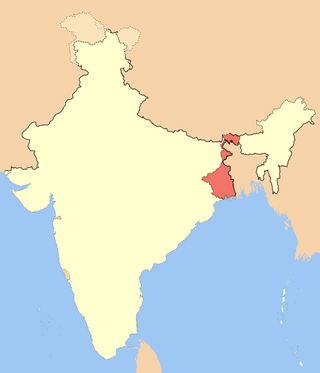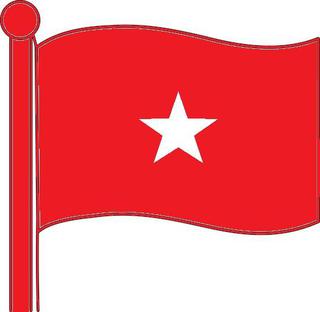Related Research Articles

The Communist Party of India (CPI) is the oldest communist party in India. The CPI was founded in modern-day Kanpur on 26 December 1925. Currently it has 2 members in Lok Sabha and 2 members in Rajya Sabha. It has the current ECI status of a state party in Tamilnadu, Kerala and Manipur.
All India Forward Bloc (Ruikar) was a political party in India, emerging out of split from the All India Forward Bloc.
The People's United Socialist Front was an electoral alliance in West Bengal, India, formed ahead of the 1952 West Bengal Legislative Assembly election. The front was composed of the Socialist Party, the Forward Bloc (Ruikar) and the Revolutionary Communist Party of India (Tagore).
The United Democratic People's Front was an electoral alliance in West Bengal, India, formed ahead of the 1957 West Bengal Legislative Assembly election. The front was composed of the Jana Sangh, the Hindu Mahasabha, the Revolutionary Communist Party of India (Tagore) and a section of independent Congress dissidents.
The United Left Front was an electoral alliance in West Bengal, India, formed ahead of the 1957 West Bengal Legislative Assembly election. The front comprised the Socialist Unity Centre of India, the Bolshevik Party of India, the Democratic Vanguard and the Republican Party.
The United Left Election Committee was an electoral alliance in West Bengal, India, formed ahead of the 1957 West Bengal Legislative Assembly election. The Committee consisted of the Communist Party of India, the Revolutionary Socialist Party, the Praja Socialist Party, the All India Forward Bloc and the Marxist Forward Bloc. The formation of the electoral alliance was announced at a mass meeting at Shahid Minar in January 1957.
The United Left Front was an electoral alliance in West Bengal, India, formed ahead of the 1962 West Bengal Legislative Assembly election. A key issue that provoked various left parties to join hands was the prevailing food crisis in the state. The front comprised the Communist Party of India, the Socialist Unity Centre of India (Communist), the All India Forward Bloc, the Marxist Forward Bloc, the Revolutionary Communist Party of India, the Bolshevik Party of India and the Revolutionary Socialist Party. The front won 74 seats out of 252.
The United Left Front was an electoral alliance in West Bengal, India, formed in December 1966, ahead of the 1967 West Bengal Legislative Assembly election. The front comprised the Communist Party of India (Marxist), the Samyukta Socialist Party, the Socialist Unity Centre of India, the Marxist Forward Bloc, the Revolutionary Communist Party of India, the Workers Party of India and the Revolutionary Socialist Party. The front won 63 seats out of 280. After the election ULF merged with the People's United Left Front, forming the United Front. The UF formed a state government, dislodging the Indian National Congress for the first time in the state.
The People's United Left Front was an electoral alliance in West Bengal, India, formed in December 1966, ahead of the 1967 West Bengal Legislative Assembly election. The front comprised the Communist Party of India, the Bangla Congress, the All India Forward Bloc and the Bolshevik Party of India. The front won 63 seats out of 280. After the election PULF merged with the United Left Front, forming the United Front. The UF formed a state government, dislodging the Indian National Congress for the first time in the state.
Bangla Jatiya Dal was a political party in West Bengal, India, led by Jahangir Kabir. It was a splinter group of Bharatiya Kranti Dal. Ahead of the 1969 West Bengal legislative assembly election, BJD sought to join the United Front. However, its entry into the United Front was barred by the Bangla Congress. Kabir's brother, Humayun Kabir had been instrumental in bringing down the UF ministry in 1967.

The West Bengal State Assembly Election of 1952 was a part of the series of Legislative Assembly elections in 1952. It was the first ever assembly election held in West Bengal.

The West Bengal state assembly election of 1957 was part of a series of state assembly elections in 1957.
Socialism in India is a political movement founded early in the 20th century, as a part of the broader movement to gain Indian independence from colonial rule. The movement grew quickly in popularity as it espoused the causes of India's farmers and labourers against the zamindars, the princely class and the landed gentry. After independence and until the early 1990s, socialism shaped some economic and social policies of the Indian government, although they mostly followed the principles of dirigisme. After this period, India moved towards a more market-based economy.
The Workers and Peasants Party (WPP) (also known as the Kirti Kisan Party) was a political party in India, which worked inside the Indian National Congress in 1925–1929. It became an important front organisation for the Communist Party of India and an influential force in the Bombay labour movement. The party was able to muster some success in making alliances with other left elements inside the Congress Party, amongst them Jawaharlal Nehru. However, as the Communist International entered its 'Third Period' phase, the communists deserted the WPP project. The WPP was wound up, as its leadership was arrested by the British authorities in March 1929.
Communism in India has existed as a social or political ideology as well as a political movement since at least as early as the 1920s. In its early years, communist ideology was harshly suppressed through legal prohibitions and criminal prosecutions. Eventually, communist parties became ensconced in national party politics, sprouting several political offshoots.

The Bolshevik Party of India is an Indian political party in India. The party was founded in 1939. The party had a certain role in the trade union movement in West Bengal and was briefly represented in the state government in 1969. In later years the party has played a negligible role in Indian politics.

Legislative Assembly elections was held in the Indian state of West Bengal in 1962.
The West Bengal Legislative Assembly election, 1967 was held in Indian state of West Bengal in 1967 to elect 280 members to the West Bengal Legislative Assembly. United Front led by Ajoy Mukherjee won majority of seats in the election, and formed first non-Congress government of the state.

Shantaram Savlaram Mirajkar was an Indian communist politician and trade unionist. He was part of the old guard of the Communist Party of India, led the All India Trade Union Congress as its president for many years and served as mayor of Bombay.
Communists were actively involved in Indian independence movement through multiple series of protests, strikes and other activities. It was a part of revolutionary movement for Indian independence. Their main thrust was on organising peasants and working classes across India against the British and Indian capitalists and landlords.
References
- 1 2 3 M.V.S. Koteswara Rao. Communist Parties and United Front — Experience in Kerala and West Bengal. Hyderabad: Prajasakti Book House, 2003. p. 219.
- ↑ Bayley, David H.. The Indian Experience with Preventive Detention , in Pacific Affairs, Vol. 35, No. 2. (Summer, 1962), pp. 99-115.
- ↑ M.V.S. Koteswara Rao. Communist Parties and United Front — Experience in Kerala and West Bengal. Hyderabad: Prajasakti Book House, 2003. p. 233.